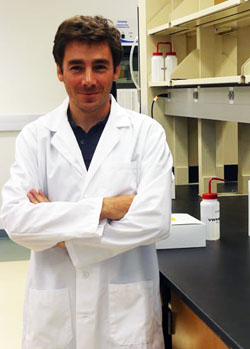 Dr. Nicolas Chomont.Much of AIDS research has focused on suppressing HIV and enhancing the immune system’s attack on the virus. But despite being able to reduce HIV viral loads to undetectable levels in many individuals, and raise T cell counts to the normal range, there are still health problems that persist. Many of these issues, including accelerated aging, premature heart disease, osteoporosis, and maintenance of HIV reservoirs, can be traced back to the chronic immune activation set in motion within days after infection. In their September article in the Journal of Immunology, amfAR fellow Dr. Rémi Fromentin, together with amfAR grantees Drs. Nicolas Chomont and Rafick-Pierre Sékaly and colleagues, refers to this phenomenon of immune activation as “the sine qua non for HIV-1 pathogenesis.” They also note that the extent of this activation is a better predictor of disease progression than viral load.
Dr. Nicolas Chomont.Much of AIDS research has focused on suppressing HIV and enhancing the immune system’s attack on the virus. But despite being able to reduce HIV viral loads to undetectable levels in many individuals, and raise T cell counts to the normal range, there are still health problems that persist. Many of these issues, including accelerated aging, premature heart disease, osteoporosis, and maintenance of HIV reservoirs, can be traced back to the chronic immune activation set in motion within days after infection. In their September article in the Journal of Immunology, amfAR fellow Dr. Rémi Fromentin, together with amfAR grantees Drs. Nicolas Chomont and Rafick-Pierre Sékaly and colleagues, refers to this phenomenon of immune activation as “the sine qua non for HIV-1 pathogenesis.” They also note that the extent of this activation is a better predictor of disease progression than viral load.
Working at the University of Montreal, their research helped establish that the cumulative effects of the chronic production of pro-inflammatory immune hormones—including interferon and certain growth factors—that is typical of AIDS, reach a plateau at only one to three months following initial infection and lead to global and long-lasting defects in immune function. They recognize that in other types of viral infection, there is a corrective mechanism to shut off this damaging inflammatory response. It is led by a pathway known as programmed death-1 (PD-1). A focus of their new work is how to harness that pathway for the control of chronic inflammation in AIDS.
They found that PD-1 can serve as a marker for abnormal distribution of the many subsets of T cells that occurs with AIDS, and that this is linked to impaired responses to one particular immune hormone: a cytokine called interleukin 7. They also discovered that prompt initiation of antiretroviral therapy (ART) can correct the PD-1 imbalance in CD4+ T cells, but that CD8 T cells, another vital part of our immune defenses, may require prolonged periods of ART before normal function can be restored.
While seeking new avenues to alter chronic immune activation in AIDS, Sékaly and colleagues concluded that for the moment, “Our findings strongly suggest that therapeutic interventions should be initiated early in acute infection before immune paralysis ensues.”
Dr. Laurence is amfAR’s senior scientific consultant.